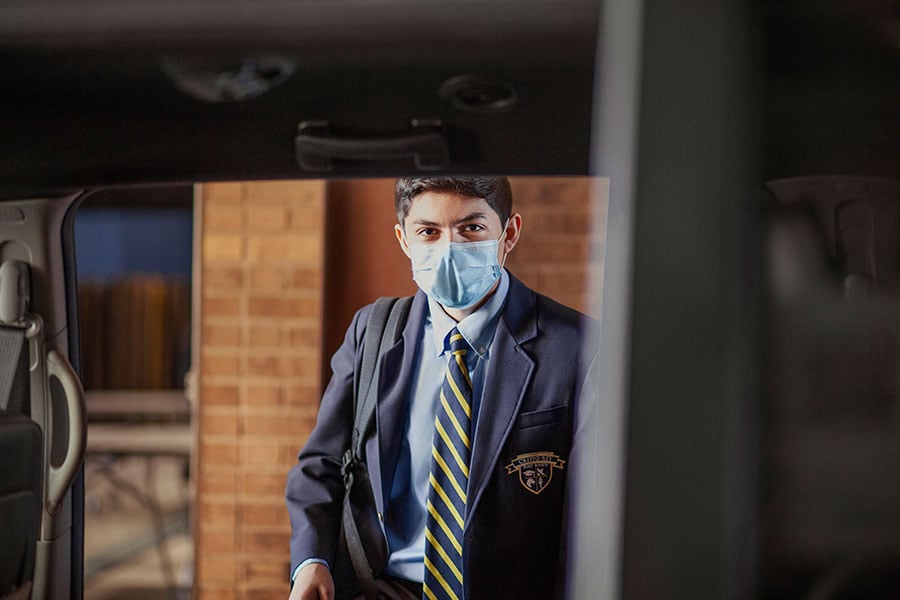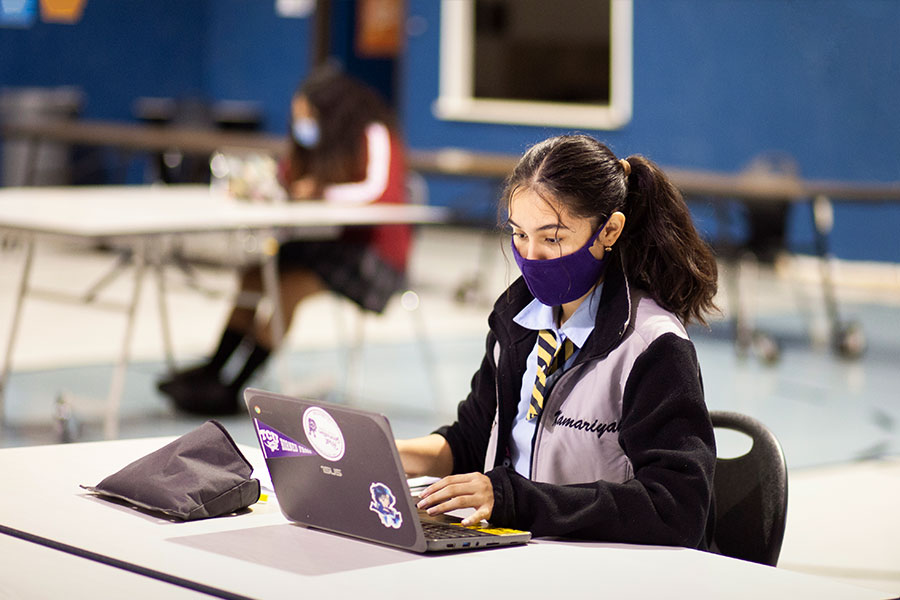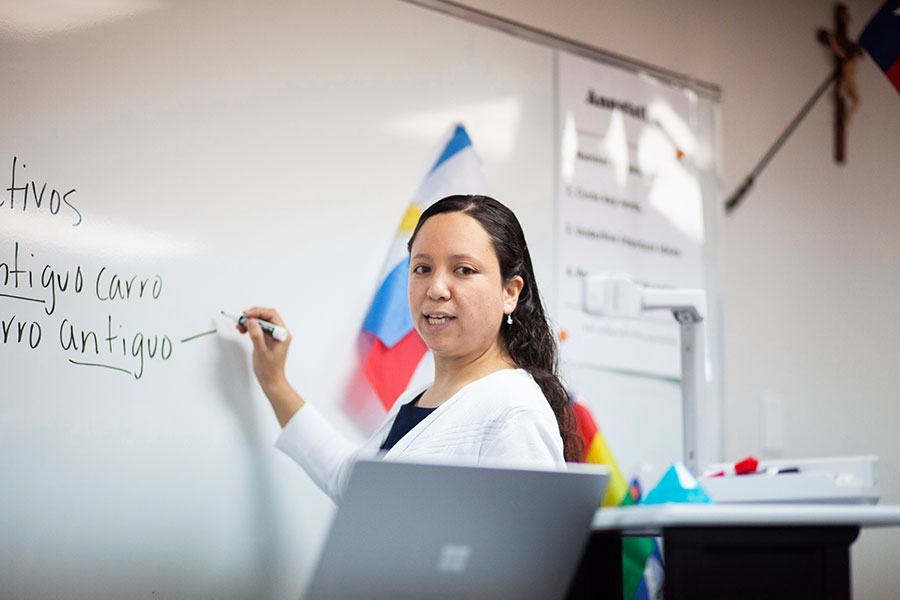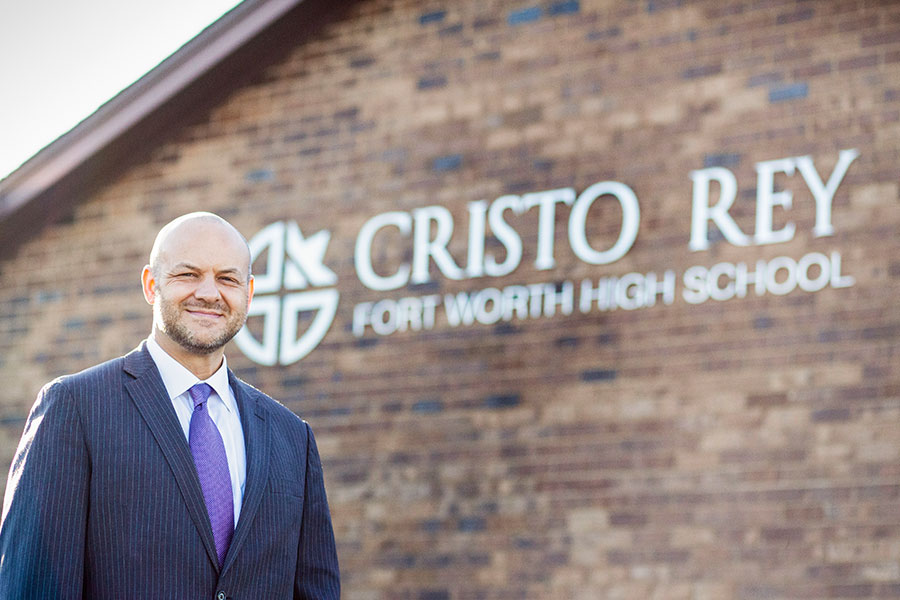Cristo Rey students, staff show flexibility and tenacity navigating unchartered waters

Miguel Castro enters a van to go to his job at JTaylor. (NTC/Jayme Donahue)
FORT WORTH — In person classes? Remote learning? A hybrid?
Since COVID-19 was declared a pandemic on March 11, school administrators have made tough decisions on how to best educate students while protecting the health of students, faculty, and staff.
Also, business leaders have wrestled with how to maximize effectiveness and productivity while keeping the work environment safe for employees and the public. A Gallup survey revealed that as of September, 58 percent of U.S. employees were sometimes or always working remotely to reduce the spread of coronavirus.
The administrators at Cristo Rey Fort Worth College Prep have had to navigate “the school that works” through rapid changes in both the school and work environment. And the students, teachers, and corporate work partners are responding with flexibility and tenacity.
On the job
Unlike most Catholic schools, Cristo Rey’s model is a work/study program, where economically disadvantaged students get a Catholic college prep education while working one day each week in a corporate entry-level job which pays the majority of their tuition.
The school has approximately 40 corporate partners. But this year, the work/study model employed during its first two years needed to be adapted to social distancing and coronavirus precautions.
For example, this was the first year GM Financial partnered with Cristo Rey, using students in their cybersecurity, human resources, dealer services, and legal teams. While the company hopes to be able to bring the students into the office later in the school year, the interns currently work remotely, logging in from the south Fort Worth school.
Ryan Bachman, the chief information security officer for GM Financial, said that frequent use of video conferencing allows the students to connect face-to-face with their work team. “It’s an appropriate and secure way for the students to make a meaningful contribution,” he said, adding that the interns were adept with technology.
Amber Castaneda, a junior at Cristo Rey, is one of four students employed by GM Financial. By working virtually on projects, including designing a new billing statement, she concluded, “I’ve already learned so much, and I feel like I’m making just as much of an impact” as working in person.
The economic uncertainty caused by COVID-19 did not prompt GM Financial to reconsider its promise to hire students, a decision the company made before the pandemic. Bachman cited a commitment to the community that originates from its CEO and said, “When the economy is strong and things are normal, it’s easier to make a commitment. But when times are tough, that’s when the community needs the most.”
Bachman hopes their interns get a clear vision of what they are working towards. He said, “A Catholic values-based education will transcend into opportunity in their future. By pursuing higher education, they will have amazing opportunity.”

Amy Arteaga, Cristo Rey junior, works at her job virtually in the gymnasium at Cristo Rey High School November 3. (NTC/Jayme Donahue)
At Cook Children’s Medical Center, four Cristo Rey students are working on-site in the human resources department, much like they did last year, albeit with fewer team huddles and group meals.
Assistant Vice President of Human Resources Beth Schmidt said Cook Children’s “keeps them very busy” with new hire paperwork, tracking benefits on Excel spreadsheets, and a host of other administrative work, including assistance with plans for a drive-through flu shot clinic.
“They do so much for us, and their work is invaluable,” she said. As an added benefit, “Their youthful enthusiasm is contagious, and it’s fun to watch them learn, grow, and be engaged.”
The decision for Cook Children’s to be a corporate partner with the high school was “an easy ‘yes’” the first year, and the second year required no discussion, said the human resources executive.
But not all students have a work assignment this year.
For students not matched with a corporate partner, or for those whose workplace has delayed the internship, the school has devised four tracks to increase the students’ value in a future workplace.
For bilingual students, the Translation & Interpretation Network at Catholic Charities Fort Worth tests, trains, then certifies the students as official translators.
Other students are in the youth leadership program through Toastmasters, which develops public speaking and leadership skills.
Another group is completing Microsoft Excel certification training, a useful tool in many occupations.
For a fourth cohort of students, local community leaders in various professions are teaching communication and marketing skills.

Herlinda Cardenas, Cristo Rey Spanish teacher, teaches to her students virtually in her classroom November 3. (NTC/Jayme Donahue)
School is in session
President Nathan Knuth started his job at Cristo Rey Fort Worth on a Monday like no other. The school had been shut down the previous Friday.
After spring break in March, the school took one day to regroup and moved to virtual classes a day later, according to Anna Brissman, dean of academics. Students “made the switch fluently,” she said.
This fall, the school continues with virtual classes, but on a synchronous schedule that mirrors the students’ typical in-person schedule.
School leadership thought long and hard about the decision to continue with virtual classes, explained Knuth. Factors they considered included advice of local health authorities; classroom size, which makes social distancing difficult; the varied student schedules, which make it impossible to keep students in small cohorts; and the results of a parent survey, which indicated that many students live in multigenerational households and parents are concerned about keeping elderly relatives safe.
Faculty and students are eager to resume in-person learning. Brissman said she sees “a whole new level of appreciation for being in school. The students see how hard the teachers are working, the teachers see how hard the students are working, and they miss each other.”
Still, they recognize several benefits that have arisen from this difficult situation.
Herlinda Cardenas, a Spanish teacher, has been impressed with the patience and persistence of her students. “It takes a lot of responsibility and discipline to stay at home and do school,” she said. “It requires a lot more from them” including time management and focus.
Brissman added, “At school, we can control what they are doing and where they are. At home, the students must advocate for themselves, taking the initiative to contact their teacher if a problem arises.”
Cardenas thinks these skills will prepare the students for future success at college and in the workplace. “They are learning how to be persistent in the midst of challenges.”
Sophomore Miguel Castro agreed, stating he must be “mentally strong to excel during these hard times.” Besides being independent and responsible, he also must practice discipline to fight the distraction of the cell phone.
On the other hand, he looks forward to Tuesdays, when he works at JTaylor, a consulting and tax firm. At work, he helps troubleshoot technology problems, contributes to the employee newsletter, and assists with other projects. “It’s a pleasure to be there every day I go,” he said.

President Nathan Knuth joined Cristo Rey in March with experience as a school administrator and a business executive. (NTC/Jayme Donahue)
The whole person
President Knuth acknowledged, “All schools, public and private, have faced a lot of challenges with this pandemic, as have corporate and local companies as well. Everyone is trying to navigate through unchartered waters with this pandemic, something that we never have experienced at this scale. No one ever prepares you for a challenge of this nature or this size.”
He and the teachers at Cristo Rey face additional challenges beyond the classroom and job sites. The president estimates about half of Cristo Rey parents have lost a job or experienced a reduction in work hours during the pandemic. The school has partnered with Catholic Charities Fort Worth to provide support to those families.
Faith, hope, tenacity, and flexibility will see the school and its community of students, parents, faculty, corporate partners, and philanthropists to the other side of the pandemic, according to Knuth.
The school continues to address the students’ spiritual needs with a weekly livestream Mass, morning prayer, and virtual retreats.
Knuth lifts up the needs of the school in his daily prayer, and he has seen God answer those prayers.
He said, “I trust in the Lord, and we keep working hard and engaging with people, and so far, people have continued to step up to the plate.... We will only get through this together. And together we are stronger.”
